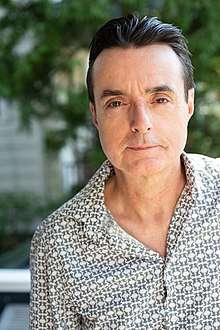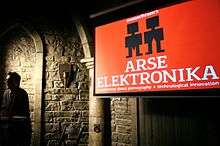Mark Dery
| Mark Dery | |
|---|---|
 Mark Dery | |
| Born |
December 24, 1959 Braintree, Massachusetts |
| Occupation | Cultural critic, freelance journalist, lecturer |
| Nationality | American |
| Website | |
|
www | |
Mark Dery (born December 24, 1959)[1] is an American author, lecturer and cultural critic. He writes about "media, the visual landscape, fringe trends, and unpopular culture."[2] From 2001 to 2009, he taught media criticism, literary journalism, and the essay in the Department of Journalism at New York University.[3] In January 2000, he was appointed Chancellor's Distinguished Fellow at the University of California, Irvine.[4] In summer 2009, he was awarded a scholar-in-residence position at the American Academy in Rome, Italy.[5]
In 2010, Publisher's Weekly reported that he was writing a biography of the artist Edward Gorey for Little, Brown.[6]
Early life and education
Dery was born in Boston, Massachusetts. He earned a B.A. from Occidental College in 1982.
Career
He has written for The New York Times Magazine, The Atlantic Monthly, The Washington Post, Lingua Franca, The Village Voice, Rolling Stone, Spin, Wired, Salon.com, "Suck.com", and Cabinet, among other publications. He has been a featured guestblogger on the pop-tech website Boing Boing. Much of his work has dealt with cyberculture and the cultural effects of the Digital Age.
Dery’s books include The Pyrotechnic Insanitarium: American Culture on the Brink and Escape Velocity: Cyberculture at the End of the Century, which has been translated into eight languages. He edited the anthology Flame Wars: The Discourse of Cyberculture and wrote the monograph Culture Jamming: Hacking, Slashing, and Sniping in the Empire of Signs. His essay collection I Must Not Think Bad Thoughts: Drive-By Essays on American Dread, American Dreams was published in Brazil, in Portuguese, in 2011 and in the United States, by the University of Minnesota Press, in 2012.

An early writer on technoculture, Dery helped inaugurate cyberstudies as a field of serious inquiry with the anthology "Flame Wars: The Discourse of Cyberculture" (1994), which he edited. Flame Wars kick-started the academic interest in cyberfeminism and Afrofuturism, a term Dery coined in his 1993 essay "Black to the Future" (included in Flame Wars) and a key theoretical concept driving the now-established study of black technoculture. In it, he interviews three African-American thinkers—science fiction writer Samuel R. Delany, writer and musician Greg Tate, and cultural critic Tricia Rose—about different critical dimensions of Afrofuturism in an attempt to define the aesthetic. The essay is in part based on Henry Louis Gates's assertion that "[t]he Afro-American tradition has been figurative from its beginnings. How could it have survived otherwise?"[7]
Dery's essay "Deconstructing Psycho Killer Clowns" is his close reading of the Evil Clown Meme.
Bibliography
- Culture Jamming: Hacking, Slashing and Sniping in the Empire of Signs. Open Magazine Pamphlet Series, Open Magazine, 1993.
- Flame Wars: The Discourse of Cyberculture (ed.). Duke University Press, 1994. ISBN 0-8223-1540-8
- Escape Velocity: Cyberculture at the End of the Century. Grove Press, 1996. ISBN 0-8021-3520-X
- The Pyrotechnic Insanitarium: American Culture on the Brink. Grove Press, 1999. ISBN 0-8021-3670-2
- I Must Not Think Bad Thoughts: Drive-By Essays on American Dread, American Dreams. University of Minnesota Press, 2012. ISBN 978-0-8166-7773-3
- Born to Be Posthumous: The Eccentric Life and Mysterious Genius of Edward Gorey. Little, Brown and Company, 2018, ISBN 978-0316188548
References
- ↑ Contemporary Authors Online, s.v. "Mark Dery" (accessed February 12, 2008).
- ↑ "Archived copy". Archived from the original on 2013-12-20. Retrieved 2013-12-20. , "Debate.org." (Accessed December 20, 2013).
- ↑ "Journalism at NYU". Archived from the original on April 6, 2008. Retrieved 2006-05-30. (accessed February 12, 2008).
- ↑ "Archived copy". Archived from the original on 2013-01-09. Retrieved 2013-12-20. "UC Irvine library website." (Accessed December 20, 2013).
- ↑ "V2_Institute for Unstable Media." (Accessed December 20, 2013)
- ↑ , Galley Cat, February 3, 2011.
- ↑ p. 187